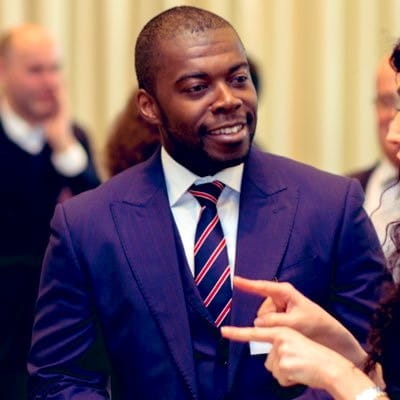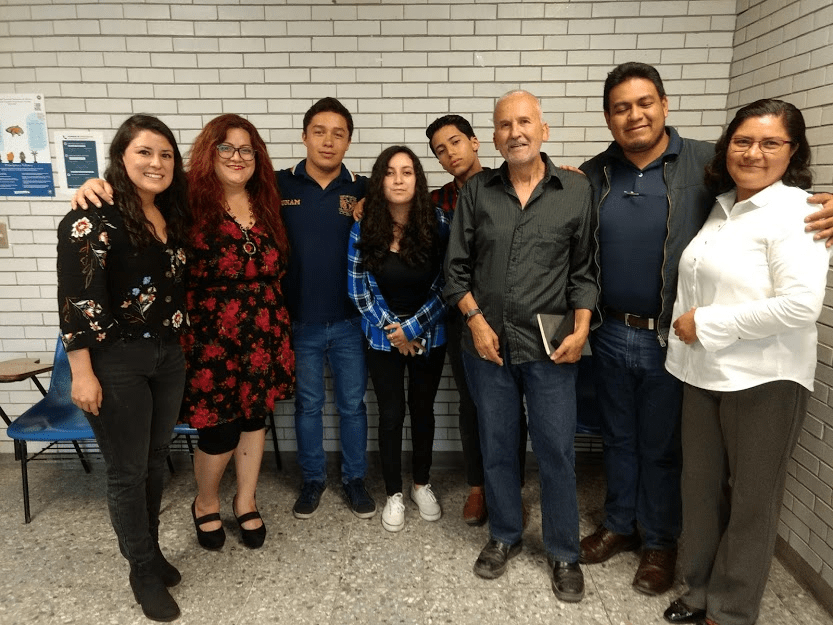Dr Andrew Yaw Tchie (MSc Conflict Resolution, 2013; PhD Government, 2019) is a Senior Fellow at the Norwegian Institute of International Affairs, where he manages the Training for Peace programme.
Tell us a bit about yourself
I started at Essex in 2011, studying for a Masters in Conflict Resolution and Peace. It was an exciting time; my background was in TV research, but I came to the point very early in my career around 2006 where I wasn’t satisfied or happy and had a desire and passion for resolving conflicts. I had spent time living in Ghana during my early teens, and I wanted to connect my experiences with contributing to and supporting the African continent as a 'son of the soil'. I enjoy what I do, it's my passion, and that is what's driven me to where I am today.

Why did you choose to study at Essex?
I wanted a place to focus on conflicts, human rights and peacekeeping research, and Essex allowed me to delve deep into conflict studies. But for me, it was the opportunity not only to understand conflicts in Africa, which is what I focus on today. A few things motivated me to do a PhD at Essex; I was still eager to learn about conflict, peacekeeping, peace, and research methods. I wanted to focus on a particular area and become a policy expert and academic in that field. I looked at many universities, some in London and some up north, but Essex gave me that space and opportunity to engage with researchers publishing at a very high level.
Essex is unique as it's a household name that most people recognise, but you also have some of the best academics across the globe. I always say to people you can go to many fancy universities because they have the title, but at Essex, you're going to get a very customised experience, and that's something that you can't you buy.
Tell us about your studies and experience here
During my PhD, I worked in Nepal for an NGO at first and then with United Nations Development Programme, Conflict Prevention Programme, where I also collected data for my PhD. I then went on to work the United Nations Mission in South Sudan as a civil affairs office, witnessing first-hand the impact of conflict. I put into practice some of the knowledge and experience gained academically at Essex –which focused on peace, conflict and peacekeeping missions (which is something I focus on now).Essex gave me the ability to use acquired research methods through the summer school programme but also apply that in a realistic environment which I do today.
While I was at Essex, I was surrounded by people from all walks of life – a mixture of backgrounds and experiences. This diverse pool of talent helped me understand differences, which is particularly unique about Essex. It's this understanding of diversity on an international level that runs through all my roles.
The early days of my career were challenging. I struggled because I didn't have any mentors who looked like me. At the PhD level, I was the only black person of African descent or Ghanaian-British, who understood the nature of conflict and on the ground realities for everyday citizens. Being a minority in the UK, you can be trying to push for diversity inclusion, but on an international level, it's different as you're also trying to understand the cultural differences that exist amongst your peers. For me, that is the Essex experience, and it was such a great life lesson.
What did you do after graduating?
After graduating, I went on to work with Syria Relief as a research and policy officer. I then moved to the International Institute for Strategic Studies (IISS), where I was Editor of the IISS Armed Conflict Database and hosted Africa session series. At the IISS, I managed an extensive database on violence against civilians, armed groups, the peace process, non-state actors and peacekeeping missions across the globe. I then went on to work at the Royal United Services Institute (RUSI), where I led the ‘Africa In Perspective’ virtual conference, hosting serving and former African heads of states, policymakers and practitioners. I also presented research at the UK’s Ministry of Defence’s ‘Defence and Security in Africa’ conference.
Where do you work now?
I’m now with the Norwegian Institute of International Affairs (NUPI), where I’ve been for the last ten months. It’s a dynamic team of experts and very different to working in the UK, mainly because I relocated during the height of the COVID-19 pandemic. I love the work I’m doing — the engagement is more focused on the African continent and I am working with some of the world’s best experts in this field.
Wow, I bet there is no ‘typical day’ for you…
A typical day in my life is unique! My day starts very early in the morning. Not one day is the same, I can go from policy to academic to practitioner, providing technical support to writing papers to debating, and that variety is something I enjoy.
Where does your passion for your career come from?
Dr Kwame Nkrumah, the first President of Ghana and a pioneering pan-Africanist, is regarded by many as one of Africa's most significant politicians. Commentators, historians and scholars have given him accolades such as ‘the Black Star’, ‘Africa’s Man of Destiny’ and ‘the Pride of Africa’. He once said, “I'm not African because I was born in Africa, but because Africa lives in me.” For me, that's how I see what I do.
My passion for Africa comes from an inherent desire to lead itself and see peace across the continent. I'm originally from Ghana and spent most of my teenage years there, so I can see how it's developed over the years. It's a testament to how Africa can be. My work aims to support the continent to be a more peaceful place, protect civilians, and ensure that Africa's capacity to lead itself is utilised through exemplary leadership. I believe that Africa has the tools to deal with its conflicts.
You’ve no doubt had a very interesting and varied career – what would be your proudest moment?
The proudest moment of my career is the point I'm at now, even though it's also been the most challenging part. I've worked for some of the best institutions in the UK, but I am in a place where people want to listen to research findings and my views of how we move the continent forward collectively. I feel more relaxed that the investment I made and those who supported me has paid off.
Do you have any advice to share with current students?
My advice to anyone reading this is that you must follow your passion, dreams and desire. One of the lessons that I have taken from life is, if you can do something that you enjoy that you have a passion for, then do it. It is a bonus to get paid for it. However, it must always be rooted in a vision, goals and a desire to see it through.
What’s next for you?
That chapter is still being written! More needs to be done – not just on the research or policy work, but the chapter of my life. As they say, watch this space!






